Are you feeling the pressure to make sustainable choices for your business but get stuck on the "why"? The constant news about environmental damage makes action feel urgent, yet the path forward seems complicated and expensive. It feels like a choice between your budget and your values, leaving you paralyzed while the problem grows bigger every day.
Yes, buying eco-friendly products is a smart and necessary decision for any forward-thinking business. The reasons are clear: they significantly reduce environmental pollution, appeal to a growing market of conscious consumers, improve health and safety by avoiding harmful chemicals, and strengthen your brand’s reputation. Choosing eco-friendly isn’t just a trend; it’s a strategic move for long-term resilience and profitability.
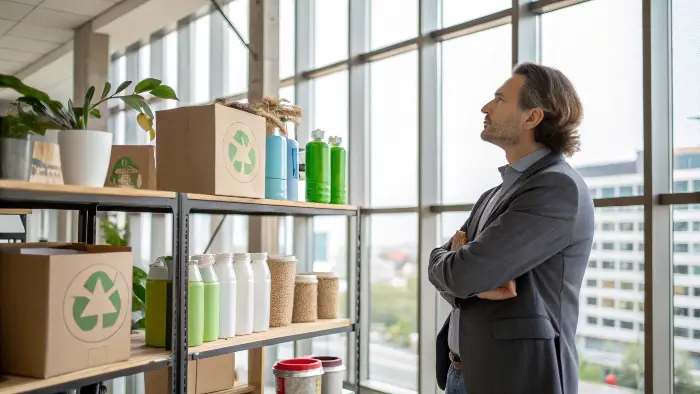
Making the switch to sustainable products can feel like a huge step. I remember when I first started in this industry, the questions seemed endless. Will it cost more? Will it perform as well as traditional plastic? Will my customers even care? These are all valid concerns. But over the years, I’ve seen firsthand that the answer to the big question—"is it worth it?"—is a resounding yes. Let’s walk through the reasons together, breaking down why this choice is not only good for the planet but also great for business.
Why should you buy eco-friendly products?
Do you find it hard to build a solid business case for switching to eco-friendly products? You might worry about the initial investment, potential supply chain disruptions, or how to measure the return. This uncertainty can stop a great sustainability initiative before it even starts, keeping your business reliant on outdated, harmful materials.
You should buy eco-friendly products because it’s a proactive business strategy. It directly addresses rising consumer demand for sustainability, prepares your company for future environmental regulations, and builds a powerful, trustworthy brand image. This isn’t just an ethical choice; it’s a market-driven decision that secures your company’s relevance and long-term success in a rapidly changing world.
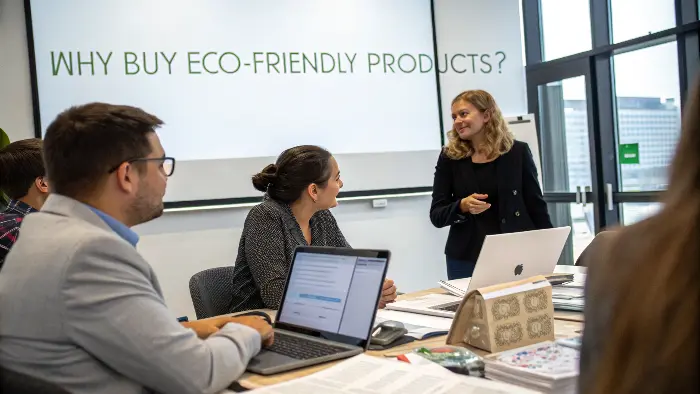
When we look beyond the initial conversation about saving the planet, the "why" becomes a powerful business argument. From my experience working with hundreds of partners worldwide, I’ve seen three core drivers consistently pushing companies toward sustainability. It’s not just about feeling good; it’s about being smart and competitive.
Responding to a Global Market Shift
The modern consumer is more informed and empowered than ever before. They don’t just buy a product; they buy into a brand’s story and its values. Countless studies show that customers, especially younger generations, actively seek out and are willing to pay more for products from sustainable brands. Ignoring this is like ignoring the rise of the internet twenty years ago. As a business, our primary job is to serve our customers’ needs. Today, that need includes a deep desire for products that don’t harm the earth. By offering eco-friendly options, you’re not just selling an item; you’re showing your customers that you hear them and that you are part of the solution.
Getting Ahead of Regulations
Governments around the globe are taking firm action against plastic pollution. The European Union’s Single-Use Plastics Directive is a prime example, but similar laws are appearing everywhere, from North America to Asia. Waiting until these regulations are enforced in your market is a reactive and risky strategy. It can lead to sudden, expensive changes, fines, and a scramble to find compliant materials. I have worked with companies that had to redesign their entire packaging line in a matter of months. By proactively switching to certified compostable or biodegradable materials now, you position yourself as a leader and avoid the future chaos. You stay ahead of the curve, ensuring business continuity and demonstrating foresight to your stakeholders.
Building a Strong, Resilient Brand
In today’s crowded marketplace, what makes you stand out? Price and quality are important, but a strong brand identity is what creates lasting loyalty. A commitment to sustainability is one of the most powerful brand differentiators available. It tells a story of responsibility, forward-thinking, and care. This resonates not only with customers but also with potential employees who want to work for a company with a positive impact. A sustainable brand is seen as more trustworthy, more innovative, and more resilient to future challenges. It’s an investment in an identity that will attract and retain the best customers and talent for years to come.
What are the tangible benefits of going eco-friendly?
You know that "eco-friendly" is a positive term, but the benefits can seem vague and hard to quantify. When trying to justify a budget, "it’s better for the environment" might not be enough. Without concrete, measurable advantages, your proposal to switch can be easily dismissed by the finance team, leaving you stuck with the status quo.
The benefits of going eco-friendly are tangible and directly impact your business’s health and bottom line. They include environmental gains like reduced waste, economic advantages like access to new markets and potential cost savings, and health improvements from using non-toxic materials. These outcomes provide a strong, data-driven case for making the switch to sustainable alternatives.
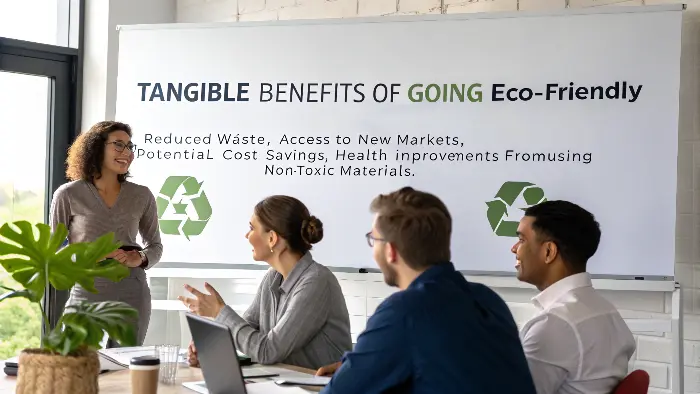
Let’s move away from abstract ideas and talk about concrete results. I’ve seen our partners at Ecosourcecn experience these benefits firsthand, and they are what truly make the transition worthwhile. A sustainable strategy impacts every part of your business, from the warehouse floor to your marketing campaigns, and ultimately, to your financial statements. The advantages can be grouped into three main categories, each offering compelling value.
A Measurable Impact on Your Operations and Environment
The most direct benefit is the reduction of your environmental footprint. Using materials like bagasse, which is made from sugarcane pulp leftover from sugar production, actively repurposes agricultural waste and prevents it from being burned or sent to a landfill. Switching to FSC-certified paper ensures that the wood comes from responsibly managed forests, protecting biodiversity. This isn’t just a feel-good story; it has operational perks. Lighter, more efficient eco-packaging can reduce shipping weights and costs. In many regions, companies that generate less non-recyclable waste also pay lower disposal fees. These are real savings that show up on a spreadsheet.
Unlocking New Economic Opportunities
Adopting sustainability isn’t a cost center; it’s a revenue driver. A powerful "green" identity opens doors to new markets and customer segments. There’s a whole ecosystem of eco-conscious consumers, retailers, and even corporate partners who exclusively seek out sustainable businesses. By showcasing your certified eco-friendly products, you become an attractive option for them. I’ve seen clients win major contracts specifically because their packaging was compostable. Furthermore, this brand enhancement drives loyalty. When a customer chooses you because of your values, they are more likely to stick with you, even if a competitor offers a slightly lower price. This creates a more stable and predictable revenue stream.
Enhancing Health, Safety, and Social Value
Many traditional plastics can leach harmful chemicals, like BPA or phthalates, into food and beverages. This is a significant health concern for consumers. Eco-friendly materials like PLA (Polylactic Acid) are derived from plant resources like cornstarch and are non-toxic and food-safe, providing peace of mind for you and your customers. This focus on well-being also extends to your own team. People are proud to work for a company that makes a positive contribution. It boosts morale, improves employee retention, and helps you attract top talent who are looking for more than just a paycheck—they’re looking for purpose. This creates a stronger, more engaged, and more innovative company culture.
Why is choosing the right eco-friendly materials so important?
So you’ve decided to source sustainable packaging, but now you’re faced with a confusing list of options: PLA, CPLA, bagasse, kraft paper. It feels like you need a degree in material science just to place an order. If you choose the wrong material for your product—one that can’t handle heat or isn’t right for your local disposal infrastructure—it can fail, leading to unhappy customers and accusations of greenwashing.
Choosing the right eco-friendly material is critical because it dictates functionality, cost, and true sustainability. The material must match its intended use—for example, CPLA for hot liquids, PLA for cold items, and bagasse for sturdy food containers. Making the correct choice ensures your product performs perfectly and its end-of-life promise, like compostability, is genuinely fulfilled, protecting both your customers and your brand’s integrity.
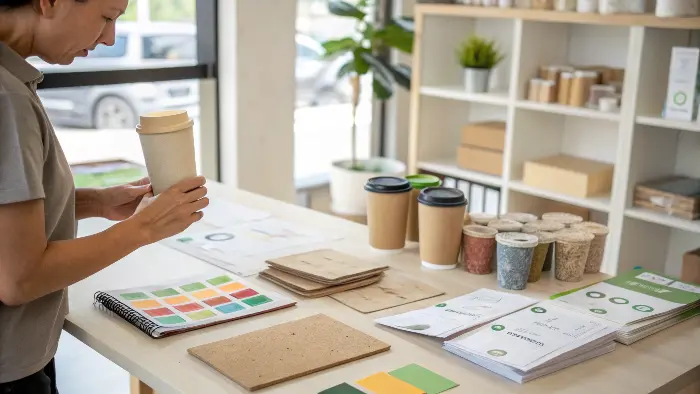
This is a question I get all the time, especially from packaging specialists like Jacky. It’s one of the most important steps in the entire process. A great sustainable product idea can fail completely if it’s executed with the wrong material. At Ecosourcecn, a huge part of our job is guiding our partners through this decision. It’s about matching the science of the material to the practical needs of the product and its user.
Comparing Common Eco-Materials
Not all eco-materials are created equal. Each has unique properties that make it suitable for different applications. A cold-pressed juice cup has very different requirements than a container for hot soup. Here’s a simple breakdown of some of the most common materials we work with:
| Material | Source | Key Feature | Best For | End-of-Life |
|---|---|---|---|---|
| PLA | Cornstarch, plant starch | Transparent, like traditional plastic | Cold cups, salad containers, cutlery | Industrial Compost |
| CPLA | Crystallized PLA | Opaque, heat-resistant up to 85°C | Hot drink lids, hot food cutlery | Industrial Compost |
| Bagasse | Sugarcane Pulp | Sturdy, microwave-safe, natural texture | Plates, bowls, clamshell containers | Industrial & Home Compost |
| Kraft Paper | FSC-Certified Wood Pulp | Strong, lightweight, printable | Bags, boxes, food wrappers | Recyclable, Compostable |
Understanding this chart is the first step. You wouldn’t use a standard PLA cup for coffee because it would soften and warp. Instead, you’d need a CPLA lid and a paper cup. This attention to detail is what separates a successful eco-product from a failed one.
The Critical Role of Certification
Once you’ve chosen a material, how do you prove its eco-claims are real? This is where certification comes in. Logos from bodies like BPI (Biodegradable Products Institute) in North America or TÜV AUSTRIA (EN13432) in Europe are not just decorations. They are your guarantee that a product has been scientifically tested and proven to break down as promised in a commercial composting facility. For wood and paper products, the FSC (Forest Stewardship Council) logo ensures the material comes from responsibly managed forests. For a buyer, these certifications are non-negotiable. They protect your business from the serious risks of greenwashing, ensure you meet regulatory requirements, and provide undeniable proof to your customers that your commitment to sustainability is real and verified. It’s the ultimate mark of authenticity.
What truly motivates the shift to eco-friendly products?
The business case is solid and the material science is clear, but you might feel there’s a bigger, more human reason driving this movement. Focusing only on ROI and compliance can feel transactional and empty. It can make you wonder if you’re missing the core message that truly connects with people on a deeper level.
Beyond the spreadsheets and regulations, the shift to eco-friendly products is motivated by a profound sense of responsibility and a desire to build a better future. It’s driven by business leaders and consumers who want to align their actions with their values, creating a legacy of positive impact. This ethical foundation is what builds authentic brands that inspire genuine trust and loyalty.
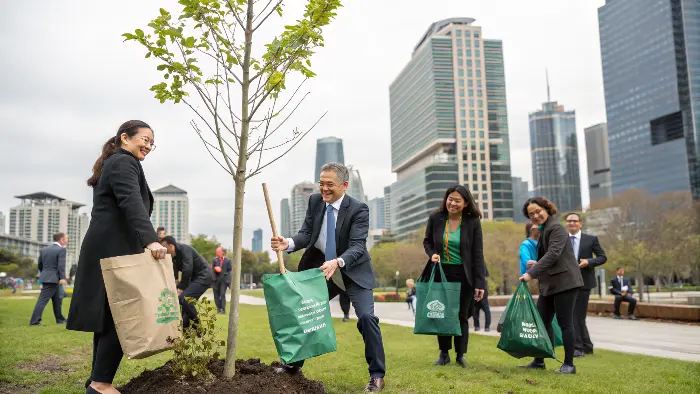
After all the technical discussions and financial projections, I find that the conversations that stick with me the most are about the "why" on a personal level. The decision to build a sustainable business often comes from a place that numbers can’t fully capture. It’s about purpose, legacy, and the fundamental belief that we can and should do better.
A Legacy of Responsibility
When I helped found Ecosourcecn, it wasn’t just because I saw a gap in the market. It was because I saw the direct impact of plastic pollution on the natural places I love. Many of our partners share a similar story. They are founders, leaders, and specialists who want to look back on their careers and know they were part of the solution. They are building a business their children can be proud of. This motivation is incredibly powerful. It drives innovation and resilience when challenges arise, because the mission is personal. It’s about leaving a legacy not of waste, but of stewardship.
The Power of Collective Action
Choosing a sustainable path can sometimes feel like a small action in the face of a huge global problem. But the real motivation comes from understanding that you are not acting alone. Every single business that rejects single-use plastic and opts for a compostable alternative adds to a powerful wave of change. Your decision sends a signal to the market that demand is shifting. This encourages more innovation, increases production scales, and helps bring down costs for everyone. You become part of a global community working toward a common goal. This sense of collective action—of being part of a movement—is a deeply human motivator that turns a simple business decision into a meaningful contribution.
Aligning Corporate and Personal Values
In today’s world, we no longer want to separate our work life from our personal values. We want our work to reflect who we are and what we believe in. I see this in product buyers like Jacky, who often have a background in environmental science and a personal passion for the planet. Making the choice to source sustainable products allows them to bring their whole self to work. It aligns the company’s mission with the personal ethics of its employees and customers. This alignment creates a purpose-driven culture, where people aren’t just working for a paycheck; they are working towards a shared vision of a healthier, more sustainable world. That shared purpose is perhaps the ultimate motivation of all.
Conclusion
Ultimately, the choice to buy eco-friendly products is a clear and powerful one. It’s supported by sound business logic, from meeting consumer demand to getting ahead of regulations. Guided by science, it offers tangible environmental, economic, and health benefits. This strategic shift strengthens your brand, builds lasting loyalty, and contributes to a healthier planet for us all.


